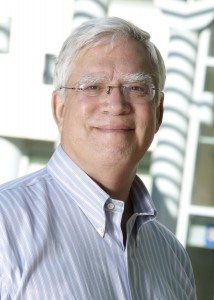A Tool Chest for Changing Times

E-textbooks. Hybrid and online courses. Using learner analytics to assess experiments that involve academic technology. The future of SmartSite.
These are a few of the areas that David Levin intends to discuss, and address, as director of Academic Technology Services for Information and Educational Technology. Below, you’ll find an excerpt from an interview with Levin. You can also read the full text.
You’re very enthusiastic about academic technology.
I love it. I’ve done a lot of different things. I didn’t start out as someone who was bitten by teaching and learning technology. I was a professor, I was interested in my research, like so many others. Technology, especially modern Internet-based technology, seems to have so many possibilities. It bit me and I didn’t stop.
What would you tell faculty who are reluctant, or aren’t sure how, to use some of this technology?
If they really don’t want it, I’m not one for trying to force it. We also have a certain number of faculty who, I guess like me, are so passionate about it, they’re going to fly on their own. If anything, we in technology want to learn from them. They’re going to find out new stuff that we can hopefully help them show to their colleagues.
For the somewhat skeptical: I like to help them look at issues or problems or stumbling blocks they have in their teaching and research, and help design something that might work. I don’t think we go into that discussion thinking, ‘this is the panacea’ and ‘this is going to solve your problem.’ No. Let’s sit down with them and design an experiment.
That approach might help a skeptic think about technology, not as an external imposition, but as a tool that might help them solve a problem.
Absolutely. I don’t want faculty to think of technology as something that anyone is imposing on them. I would love to start with, ‘What’s a problem you have?’ and let’s see if we can design an experiment that would work. I like to look for new experiments and new ideas about how we can make things change.
To some extent, in this time of change in higher education, it’s a good thing technology is changing fast. We want to do lots of different experiments, not try to find a cookie cutter that fits every problem. We need a tool chest, rather than a hammer.
That’s a good summary.
Well, if you only have a hammer, everything looks like a nail. I’d rather have the tool chest, and let’s open up and see which tool works.
I always say, with any of these ideas: Don’t start something without starting an experiment. There are many good reasons to experiment. We don’t want to make changes that don’t have success. Also, it builds excitement among the faculty and staff who are doing the experiment, because then you’ve got a story to tell at the end of the day.
I imagine you welcome faculty who want to talk with you about all this?
Absolutely.
What’s the best way for them to contact you?
Send me an email (dslevin@ucdavis.edu) or call me (530-752-2133). Even better, as much as I live in the virtual world, I want to get together and talk with you. So, set up an appointment. Drop by.
